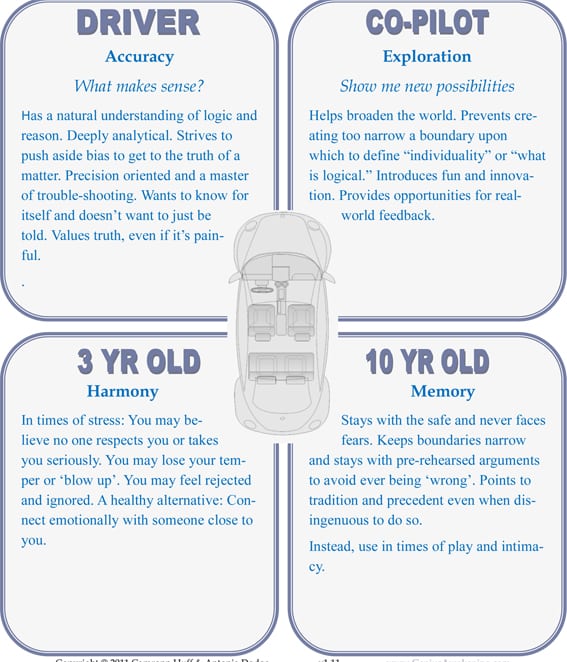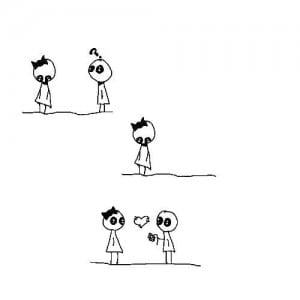
We have a philosophy at Personality Hacker that each of the Myers-Briggs types is imperative to the social ecosystem. Like an orchestra that requires every musician, we all bring something that the world needs.
Depending upon the time period in history and the culture of any particular location, the niche our personality type fills may be celebrated or demonized.
Since our self-esteem can’t help but be influenced by the world’s feedback some of us can take it rather personally, especially if we fall in the ‘demonized’ category. Keeping that in mind, let’s talk about INTPs.
The INTP Personality Type
To get inside the experience of an INTP it’s important to acknowledge how they enter the world and how the world responds back.
 In our car model, an INTP’s Driver is Accuracy, technically called Introverted Thinking.
In our car model, an INTP’s Driver is Accuracy, technically called Introverted Thinking.
Accuracy is the part of us that asks, “Does this make sense?” It scans for incongruities and/or when information doesn’t add up. It seeks truth without judgment.
If you’re mistaken and an Accuracy person corrects you, it’s not personal. They honestly would want that information themselves and so they expect you want it, too.
The Co-Pilot process is Exploration. Its technical name is Extraverted iNtuition.
Exploration figuratively rolls up its sleeves and engages with the environment, exploring the world and understanding new patterns.
Some of this can be done conceptually, reading about new ideas and concepts. But the highest quality Exploration is done when the person is experiencing something novel to them and getting out of their comfort zone.
Accuracy combined with Exploration creates a zoom-in/zoom-out dynamic with information. Accuracy zooms way in to see all the moving parts of a system (whether conceptual or mechanical) and master how they interrelate with each other. Exploration zooms out to take in a much bigger picture and determine if the system fits into the larger meta-system.
Sometimes complete mastery of an idea or subject leads to erroneous conclusions if there is no cross-pollination with other disciplines. Exploration helps keep an INTP from too much subject myopia. It also encourages a test/iterate process, a necessary tool in vetting hypothesis.
This results in identifying holes in logic, seeing how concepts break down and then playing with other concepts.
For an INTP ideas are like Legos with an infinite number of combinations, though some constructions are clearly superior to others. If you tell an INTP your belief system, their talent is to spot all the strengths and weaknesses in the design.
This hasn’t always gone well for INTPs.
INTPs have historically been in a precarious situation. They offer to the world a healthy dose of radical honesty by questioning the status quo and the accepted belief systems of the time. That’s a tall order. We get pretty attached to our belief systems and we’re none too friendly to people who try to take them from us.
Not that an INTP is trying to take anything from anyone, they’re merely observing what seems obvious to them. Or maybe questioning what seems obvious to everyone else, but makes no sense to the INTP. In times past, merely suggesting anything other than the status quo could get you a hemlock cocktail for your troubles.
Please don’t think I’m implying that all INTPs are “know-it-alls” or even that their own logic is always sound. In fact, the more developed an INTP gets the less they assume they know everything and the more they’re open to being wrong. But woven into the fabric of an INTP mind is a talent for formal logic, and if they pursue the skill they can outclass just about everyone else. It is, after all, what they bring to the ecosystem.
 When an INTP is allowed to be themselves without punishment there is a real sense of childlike wonder for the world. There are so many possibilities and so many delightful puzzles to solve.
When an INTP is allowed to be themselves without punishment there is a real sense of childlike wonder for the world. There are so many possibilities and so many delightful puzzles to solve.
Even if an INTP ends up with more questions than answers, that’s okay. At least they had the opportunity to ask them! There’s no desire to hurt anyone, only a desire to know.
To an INTP, all thoughts and belief systems are subject to change as information is collected and evidence mounts. To attach to an idea means losing your edge.
I’ve seen an INTP argue vehemently for a position only to hear a piece of data that had them completely restructure their thoughts in real time. With eyes widening in understanding and pausing long enough for all the data points to switch around internally, it was as if a piece of the puzzle they didn’t know was missing finally presented itself.
There was no ego to it. No “you won, I lost.” There was only gratitude at getting one step closer to truth.
INTPs and Respect
Show an INTP that not only do you know your stuff but that you have novel new patterns to share and you’ll gain an instant fan. It’s so delightful to an INTP to find someone who knows more than they do in any field that interests them. Even if they graduate beyond you, there will always be a sense of appreciation for the part you played in their lives.
Unfortunately, not all of us hold so loosely to our beliefs and ideas. In fact, most people will only let you pry their paradigm from their cold, dead hands.
We call it having our faith ‘shaken’ and it can be devastating, some of the most real pain a person will ever experience in their lives. INTPs can also experience a “shakening,” but for the INTP there’s a powerful intrinsic reward for rooting out dissonance.
Other types can also gain rewards for getting closer to their subjective truth, but not nearly on the same level. So INTPs take the plunge for us.
We love and hate them for this, celebrating them as characters in TV shows and movies but resenting them when they’re debating the ever living hell out of our arguments in real life.
Our fickleness takes a real toll on them. We mistake their digital approach as robotic and we forget just how much our responses can hurt their feelings. If you continually presented gifts to other people and they continually rejected them it would be easy to question the value of your gifts.
Most of us conflate our beliefs with our identity. An INTP gives the gift of challenging that identity and those beliefs. They challenge people to question who they are at the core.
It’s not that the gift of radical honesty is without value, it’s that most of us aren’t ready for that kind of gift. When we are ready, though, it’s invaluable.

INTPs are powerful. When at the top of their game they can alter how entire societies see reality. While we can’t know their types for a certainty, there’s a lot of yammering about Einstein and Socrates being INTPs. We now experience reality differently because of the thoughts of these men.
On the flip side, when an INTP is suffering they can bring a powerfully toxic element. Without rigorous intellectual honesty the gifts of an INTP can become a weapon, hurting others as they themselves hurt.
The more an INTP gets into their Co-Pilot process of Exploration, however, the more they see how to present their ideas in a way that doesn’t immediately turn others off.
Intellectual dog piling, while seductive, is the least effective way to persuade another person. But comedy, formal debate, scientific research and technological advancements… these are all extremely influential. When an INTP experiences enough of life to gain clarity on what means something to them and goes for it they can be truly unstoppable.
A Word on Motivation
Many INTPs struggle with being motivated to do anything. This can come from being repeatedly ‘knocked down’ by other people in their lives, or it can simply be from seeing the absurdities of life. Self-discipline can be difficult to develop, though it’s just a skill like any other.
The easiest way to develop self-discipline is to ask yourself which problems are most interesting to you to solve and go after them like a juggernaut. When you’ve discovered the answer for yourself, do what you can to share the solution with other people.
Sharing your discoveries with others requires you to pick up all sorts of skills, including the art of persuasion. Stay focused and on track.
When you’re really into something you can focus on it like it’s the only thing in the world. Choose something that fascinates you, is a challenge to be solved, and continue to develop enough compassion to bring your findings to the world. That is the seed of motivation.
If an INTP shows up cynical and in pain, always needing to be right and self-protective, they can shut off their compassion mechanisms. They retreat to their 10 Year Old process of Introverted Sensing, or what we call “Memory.”
Memory’s greatest desire is to feel safe, and when done well people who favor this function ensure that we’re all going to be okay. But it does so by finding a status quo, the very thing that most INTPs are accused of trying to compromise. So how does this work?
The INTP finds their own ‘sweet spot’ of safety, their own individualized status quo to which others must conform. Massive Multiplayer Online games showcase this kind of society, as does the seedier places of the net like 4chan, where insulting each other’s mother is foundational.
It’s both hilarious and horrifying, and while (as an ENTP) I can find the hilarity, it’s pretty clear that these are not the healthiest examples of any type.
When an INTP loses their compassion it’s done out of cynicism, a fear that they (and their gifts) will never be acceptable.
Since their 3 Year Old process is Extraverted Feeling, or what we call “Harmony,” they actually have an easier time of pretending they don’t care what others think of them. Any pain of rejection is easy to compartmentalize, with a mistaken belief that it’s been handled. There’s a sense of, “Fuck you, I’m making my own rules
This may be fine for a time, and by ‘for a time’ I mean up to many decades for the INTP. But there’s no real sense of meaning or purpose, and their inner wisdom can’t help but scream they’re bullshitting themselves.
In the midst of cognitive dissonance, ultimately the INTP turns on themselves like a starving animal eating its own tail. It’s not sustainable.
Destruction to Make Way for Creation
I liken INTPs to the intellectual version of Shiva, the great Hindu god of destruction. Shiva destroys to make ready for new creation, like a brush fire removes dead wood and prepares the soil for new growth.
Nobody really likes Shiva when he’s in full destruction mode, but without the service there would only be stagnation and ultimately doom.
In a similar vein, nobody really likes to have their long-held beliefs questioned. But without the service we would stagnate in every technology: social, evolutionary, paradigmatic, and gadgetry.
A lot of our pain lives in our 3 Year Old process since it’s also our blind spot.
For most people the struggles of companionship, connection and contribution are solved using the Harmony process, even if it’s not a function in their ‘car’. But for an INTP the need to connect with others can sneak up on them, even if they’re better than most at ignoring or even transmogrifying that need.
I often refer to the 3 Year Old mental process as the Aspiration. I think I picked this up from Linda Berens, or maybe even Dario Nardi. Regardless, the theory is that we experience challenges that seem easy for other people to solve because they have easier access to the ‘appropriate’ cognitive function. If that function is our inferior – our 3 Year Old – we don’t have the same access because it’s our blind spot. We’re forced to come up with novel new ways of solving those same challenges using our native strengths.
It can be frustrating work. And for an INTP, figuring out how to connect with other people can be exhausting. The current world undoubtedly favors the Harmony process over Accuracy. An INTP has to figure out how to connect with other people without playing all of the social games.
I’ve observed INTPs do this through skill development that blows other people away (like Neil Peart, the drummer of the progressive rock band Rush); by owning their quirkiness unapologetically while keeping their genius (like Albert Einstein); by being hilarious (like comedian Dmitri Martin); by creating an environment they would want that helps others (like Zappos CEO Tony Hsieh); or through massive contribution (like Marie Curie).* p>
INTPs and Approval
There is a Janus-like quality around approval for an INTP. The need to be recognized for one’s work seemingly contradicts the need to be independent and set fire to the status quo. Contribution sates both desires.
 And, of course, love. An INTP in love is an adorable thing, and while they may not be the most attentive lovers in a traditional sense they can be some of the most solid. There is a sense of loyalty an INTP develops since connections are so difficult to come by. The INTP also has an admirable respect for the other person’s individuality.
And, of course, love. An INTP in love is an adorable thing, and while they may not be the most attentive lovers in a traditional sense they can be some of the most solid. There is a sense of loyalty an INTP develops since connections are so difficult to come by. The INTP also has an admirable respect for the other person’s individuality.
As mentioned before, the process of Accuracy adopts a nonjudgmental stance about information and personal truth. If you’re forthcoming with your own truth an INTP has the capacity to hold space for things that would send other people into the seventh orbit of the sun.
For people of other types, knowing they’re going to be honored as an individual without judgment can be a pretty heady thing. Full acceptance is a novel experience to a lot of people. It can be a challenge to stop playing all the emotional games we’ve been programmed to play.
If an INTP is interested in you as a person you’ve already passed their vetting processes. Once given the green light (and they sense no real danger) an INTP can develop intimacy at a surprising speed. And, again, that childlike wonder surfaces.
Friendships are extremely important to INTPs, with humor often being a cornerstone. Connecting with other people through a shared appreciation of the absurd is an easy, nonthreatening inroad. But there’s always going to be a desire to spar intellectually and play with other people. If you’re an INTP and your friendships don’t allow for a healthy amount of intellectual play it’s time to branch out and get that need met.
 Finding people of like minds is imperative. When an INTP is accepted for the gifts they bring of radical honesty, cheerful wonderment, and intellectual playfulness; when they are in a position to solve puzzles and challenges and share their findings with others; and when they accept that their gift may be socially thankless but they’re going to persevere and keep going, you see a happy and extremely healthy INTP.
Finding people of like minds is imperative. When an INTP is accepted for the gifts they bring of radical honesty, cheerful wonderment, and intellectual playfulness; when they are in a position to solve puzzles and challenges and share their findings with others; and when they accept that their gift may be socially thankless but they’re going to persevere and keep going, you see a happy and extremely healthy INTP.
And we need as many of them as we can get.
-Antonia
*With the exception of Tony Hsieh, I haven’t personally profiled any of these people, some of whom are dead. Type guesses are just that and subject to being wrong.
Want to learn more?
Discover Your Personal Genius


Share:
The Link Between Your Sexuality and Your Social Image
INTP Survey: 5 Things INTPs Wish They Had Known as Teens
90 comments
Also sorry for bad english.
I am frustrated learning about Ti and Fi. I don’t know if I am INTP or INFP. You stated that INTP lacks motivation, and yes, I do. What about INFP? They only do what they’re passionate about. When no desire = it’s not done. So what’s actually the different traits between types that NO OTHER TYPES can have? I find all these descriptions are too broad and situational.
I’ll give some details in hope you can help me determine my type? Much appreciation before.
My relation to feelings:
I am depressed and care much about the meaning of my life, why am I conscious? I also dreamt about bringing contributions to the world and be remembered (when I was a child).
My emotions are turbulent, I can’t recall any of them when I’m not feeling it. It’s even hard to explain because it’s highly inconsistent. Borderline pd might contribute to this. I didn’t like my feelings and tried to push them aside. But I also engage with it alot.
I have a high sense of idealism, and sensitive when weak people or animals are wronged. I am disappointed with the world in regard of this. I care about silly things no one cares about (maybe), like how everyone ought to learn parenting before having any children.
I have blunt expression, but I laugh big when I am with my friends. Love-hate relationships with people. Studied psych. Get bored and tired with relationships.
I don’t think I have vivid imaginary world like many INFP descriptions. I do alot of concepts and possibilities, but in my mind they’re only vague structured images.
So…what confuses me is my relation to Ti:
In discussion, I always detach myself from emotions and bias. I don’t like to mix up feelings with truth. You may feel certain ways, but truth is truth. I like to analyze how something works before engaging with it. I have to understand the inner working of things from the scratch by myself. Back in the days, I used to argue alot and asked why, and I don’t remember when I started to shut up. In school, I argued with my religion teacher. I didn’t learn math and got best scores in classes whenever logic can still be applied. I suck at memorizing those math formulas. Now I have fear about getting more and more stupid, ever since I’ve been highly depressed, I feel like that… Sometimes I don’t think or feel anything. Sometimes it bursts out in negative way or inspiring way.
My opinion about Fe: I don’t do it well.
About Te: when I read about it, my first thought was it was against my method… I don’t apply or agree to something before I understand how it works.
I identify with Fi (at least now) and see alot of it in me. But I have close relationship with accuracy, even before knowing MBTI. Looking into the theory, I could not accept that someone can’t have both Fi and Ti. It’s not about my ideation, it’s just how it is if I’m being honest. In fact, it’s been a vital theme in my life: considering both feeling and reason together. So, my explanation is the theory is not adequate enough explaining this or the function definitions are not differentiated enough.
However, I see the logic behind Jung’s framework and would keep trying to frame it myself. Sorry for the long (cynical) comment! I just couldn’t get it out of my mind. Give me your opinion about my type. :)
I’m somewhat unsure of my personality type. Two years ago, I was a full fledged INTJ and last night for whatever reason I felt compelled to take another personality test and found I was in fact, an INTP. I have now taken numerous tests and still recieve the same result.
It feels strange since two years ago, I did the same thing and was certain that I was an INTJ. The funny thing is both personality types are apt descriptions of myself. I adore viewing things from every perspective possible which is an intj trait, yet I have a need to find the unbias truth which is resemblant of the intp. This is one of many conflicted areas I find myself in, between such types. I find myself to be 50% intj and 50% intp. Naturally, this irks me, because it seems non-sensical to be both intj and intp. Then again, I’m sure I can identify with other intuitive types.
Which begs the question, perhaps the whole construct of personality types is somewhat flawed? I can’t help but think that it’s virtually impossible to categorise ourselves to one type or another. There are certain variables in life. Call them ‘constant variables’ if you will. People and personalities are such variables.
Does it make sense to try and pin-point ourselves to 1 out of 16 types? Surely, we are more complicated and multifaceted than that? Yet, maybe that’s my belief that as humans we are not meant to be understood but we try so vehemently to do so. My point is, well I think it’s more of a question: is human nature fuelling our need to categorise ourselves into such types?
And if we succeed in doing so what does that achieve? Are we more self-aware or have we fallen prey to a percieved self-awarness fuelled by the limitations of human nature itself? In other words, have we fooled oursleves?
Similarly, I do understand that the study of one’s personality type can be fulfilling and enjoyable, yet there are times when we are, in my mind blinded by our humanity.
This is definitely more of a philosophical question and can probably be applied to many aspects of life and much like trying to categorise ourselves to personality types, my attempt to assert the limitations of human nature on various constructs is quite non-sensical also. Alas, I do it anyway. (Prime example of the contradictory nature of man.)
It might also be worth noting that I am 18 and perhaps my personality is still underway. Hence, I am no longer the intj I was at 16, and now at 18 I have evolved into an intp. Perhaps, these personality types are an accurate reflection of your personality at the time, but naturally, are subject to change.
This fact is what leads me to believe that as humans, we are simply too much of a variable to pin-point and define in the long-term. From this standpoint, personality types are redundant, but in the short-term they are quite an accurate tool.
Strangely enough my question was exactly that: how accurate are personality tests? But through that ramble I managed to somewhat make sense of it.
Feel free to add to this.
This has got to be some crazy cache issue with Wordpress. Three of us individually have attempted to fix this issue by erasing and re-uploading the image multiple times with the correct extension name.
It remains a burr under my saddle, but alas and alack. We’re just gonna have to make peace.
A
One of my best friends is an intp (I am an infp) and the main level we connect on is our sense of humour. It is very, very similar. I believe sharing the third function with somebody in some sort correlates with a similar sense of humour.